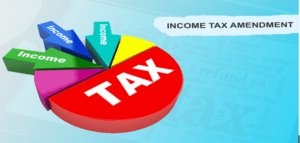This is a sequel to the article titled ‘the intricacies of the minimum chargeable income’. From a cursory reading of the provision of section one of the Income Tax (Amendment) Act, 2023 (Act 1094), the content of that section requires an entire article to digest its interpretation, implications, and its consequences. This article is to analyse section one of the Income Tax (Amendment) Act, 2023 (Act 1094) by interpreting the law, ask unanswered questions and make some recommendations to policy-makers, tax administrators, taxpayers, tax practitioners, and civil society organisations (CSOs) on the best way forward.

- Income Tax (Amendment) Act, 2023 (Act 1094)
Section 1 of Act 1094 states that the Income Tax Act, 2015 (Act 896), referred to in this Act as the “principal enactment”, is amended by the insertion after section 2, of “Minimum chargeable income”.
2A. (1) Despite section 2, a person may be required to compute and pay tax on a minimum chargeable income of five percent of turnover where the person has been declaring losses for the previous five years of assessment.
(2) Subsection (1) does not apply to a person
(a) within the first five years of commencement of operations; or
(b) engaged in farming”.
Some key phrases and words which require critical examination in my bid to interpret the section have been boldened for easy referencing.
There are some phrases which require some clarity, such as “has been declaring losses for the previous five years.” Does it mean for the rule to apply, the taxpayer must declare continuous losses for each of the previous five years from the period the determination is being made? And the use of the verb “may” instead of “shall” makes it not mandatory, but determination will be at the behest of the Commissioner-General (CG).
2. Income Tax Act, 2015 (Act 896)
According to section 1(1) of Act 896, income tax is payable for each year of assessment by a person who has chargeable income for the year; and a person who receives a final withholding payment during the year. This means for a person to be liable to pay income tax for a year of assessment, that person must either have a chargeable income or must have received a final withholding payment.
However, upon the passage of Section 1 of Act 1094, some other category of persons may be required to pay tax on a minimum chargeable income even though they did not originally have a chargeable income as stated in section 1 of Act 896.
Section 2(2) of Act 896 states that a person who determines the chargeable income of that person or of another person SHALL, determine chargeable income from each source separately.
Section 2(1) of Act 896 explains that the chargeable income of a person for a year of assessment is the total of the assessable income of that person for the year from each employment, business, or investment less the total amount of deduction allowed that person under this Act.
Reading sections 1 and 2 of Act 896 together, and contrasting it with section 1 of Act 1094, it can be deduced that the determination of a chargeable income under 896 is obligatory on the taxpayer while the determination of the minimum chargeable income under Act 1094 is not obligatory on the taxpayer but rather a discretionary power of the CG which the CG can exercise when the conditions set in Act 1094 are rife.
3. Interpretation to section 1 of Act 1094
The understanding of the following words and phrases are paramount in the interpretation of the section:
a. Despite section 2 of Act 896
This means notwithstanding the provisions of section 2 of Act 896 which has been articulated earlier.
b. “a person may be required” to compute and pay tax on a minimum chargeable income
This means taxpayers are not obligated but may be compelled by the CG to compute and pay tax on a minimum chargeable income of five percent of turnover where that taxpayer has been declaring losses for the previous five years of assessment. The use of the phrase “may be required” instead of “is required” or “shall compute” makes it not mandatory on the taxpayer to undertake such an activity unless they are compelled by the CG.
c. If the taxpayer is not required to make that determination, then who is required to undertake that exercise?
Section 1 of the Revenue Administration Act, 2016 (Act 915) perfectly answers this question, that the Ghana Revenue Authority (GRA) – through the CG – is responsible for administering and giving effect to tax laws in accordance with the provisions of the GRA Act, 2009 (Act 791) and the CG may give written directives that are necessary for the administration and implementation of tax laws.
d. How the CG can enforce the rule in practice
The rule can be enforced by the CG during audit of taxpayers. When tax auditors realise that a person who is not engaged in farming and has commenced operations more than five years ago has been declaring losses for the previous five years of assessment, the CG may compute a notional chargeable income (minimum chargeable income) of five percent of turnover for the taxpayer to pay tax on irrespective of its loss position.
4. Lingering questions on the content of section 1 of Act 1094
A critical reading and analysis of section 1 of Act 1094 reveals some questions which require answers. Although section 133 of Act 896 also witnessed some amendment under Act 1094, some key words in section 1 of Act 1094 were not defined in the amendment of section 133 of Act 896 and this has led to the questions that follow:
a. What constitutes turnover? Is it the aggregate turnovers of the previous five years during which losses were declared or the turnover of the year the determination is being made?
b. Does the expression “has been declaring losses for the previous five years of assessment” mean that for the rule to be triggered, the taxpayer should have declared continuous losses for the previous five years? And will any profit declared within those five years reset the count?
c. Does commencement of operations mean the date of commencement of commercial activities, or is it the same as the date of commencement of business?
well guided answers to these questions are paramount in the interpretation and implementation of the policy.
5. Summary of my interpretation of section 1 of Act 1094
Section 1 of Act 1094 is an anti-avoidance policy to be exercised by the CG to compel taxpayers other than those engaged in farming or those who commenced operations within the first five years to compute and pay tax on a minimum chargeable income of five percent of turnover where the person has been declaring losses for the previous five years of assessment.
This enforcement activity may be triggered by the CG when during audit, it becomes eminent that the continuous losses being declared by the taxpayer are due to aggressive tax planning or any other practice which hurts tax revenues. It is my expectation that the application of the policy will not be conducted wholesale since there are some taxpayers who are facing genuine challenges in their operations, leading to losses and not as a result of any tax avoidance schemes.
6. Other schools of thought on the interpretation of section 1 of Act 1094
From my readings on other write-ups on the subject and my engagement with some tax practitioners on their interpretations of the section, it seems some are of the opinion that taxpayers are automatically obligated to self-assess themselves and compute tax on minimum chargeable income of five percent of turnover when they declare losses in their previous five years of assessments if they are not engaged in farming business or they are not within their first five years of operations.
However, a critical analysis of the provisions of the section seems to lead to a dissenting opinions to those schools of thought.
7. Conclusion
In conclusion, from the analysis of the interpretation of section 1 of Act 1094, one can conclude that the anti-avoidance policy to levy tax on a minimum chargeable income of five percent of turnover of persons other than a person engaged in farming business or a person who is within its first five years of commencement of operations is a revenue assurance tool to be exercised by the CG to counteract taxpayers who abuse the tax laws through aggressive tax planning measures, leading to continuous declaration of losses when they are expected to be declaring profits and pay appropriate taxes.
The CG should sparingly trigger enforcement of this policy, and not to use it as an everyday rule due to the harmful impact of the policy have on some businesses which are genuinely suffering, leading to them declaring losses after being in operations for more than five years to prevent them from eminent collapse.
- Recommendations
The writer recommends the following for consideration:
- Policy-makers should hold stakeholder engagements and consult the following groups – taxpayers, tax practitioners, CSOs and other interested groups – in their deliberation on the best way to implement the policy.
- I invite other practitioners to join the debate to express their opinion on the policy and its effects on taxpayers and the economy to guide the implementation of the policy.
- I believe the promulgation of a legislative instrument (LI) to provide further clarity on the law by answering the various questions raised in the article and provide some blueprint on the application of the policy will be worthwhile.
The issuance of an administrative directive from the CG on the matters raised concerning the policy may not be enough.
- GRA should embark on taxpayer education on the policy to ensure that taxpayers are much educated on the policy.
- Taxpayers are to engage their tax consultants for them to plan on how to manage their tax risk exposure as a result of this policy.
This article is my contribution to the debate on the implementation of section 1 of the Income Tax (Amendment) Act, 2023 (Act 1094) from a professional tax practitioner’s lens in the discharge of my duties as a Ghanaian citizen who seeks the success of Ghana.
The author is a Chartered Tax Practitioner – a member of ICAG and a member of the Chartered Institute of Taxation Ghana.
[email protected]; @ib_asare; 0244 423 960










